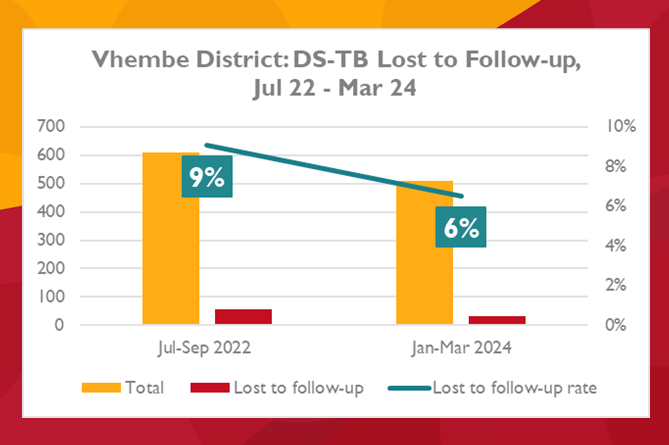At the launch of the USAID-funded ACCELERATE 2 program in Vhembe District in January 2024, the THINK team conducted a baseline assessment of all TB treatment outcomes. The results showed that the district faced a 9% Lost to Follow-Up (LTFU) rate from the July to September 2022 period, indicating that more than 50 TB patients had stopped their TB treatment before completion. The high LTFU rate was a barrier to achieving the district’s TB treatment outcome goals and was contributing to the spread of tuberculosis in the community.
THINK’s strategy was to help reduce this rate and improve treatment adherence by implementing a targeted intervention. The intervention relied on teams travelling across the district to contact and counsel patients who had missed their treatment appointments. Key actions included:
- Engagement with health facilities: Collaborating with facilities to identify lost to follow-up patients and gather insights on possible reasons for non-adherence.
- File audits: A detailed review of patient records was conducted to assess treatment status and identify gaps in the follow-up process.
- Tracing of patients: Both telephonic and physical tracing were used to reach out to patients and encourage them to restart to treatment. Community health workers made door-to-door visits in some cases.
- Capturing patient data on Tier.net: Data entry and tracking on the national HIV and TB database ensured that all patient interactions were documented, which provided accurate records for monitoring treatment progress and planning further interventions.
Reviewing the outcome data for the period January to March 2024, after THINK’s intervention, the rate dropped to 6%! This 3% reduction was achieved through regular audits, diligent progress tracking, engagement, and consistent follow-up with patients. The efforts of the roving teams and the collaboration with local health facilities and the HIV/IDS/STI/TB (HAST) team from the Vhembe Department of Health were key in bringing patients back to care and reducing the number of individuals lost to follow-up.

